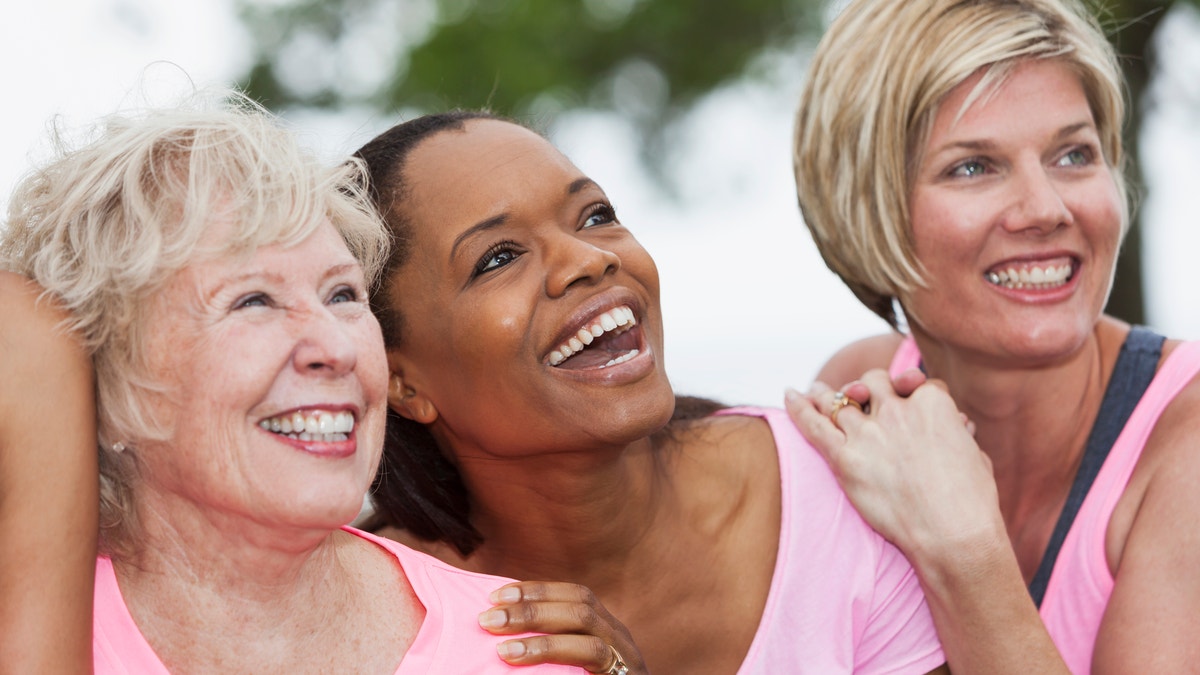
Multi-ethnic women (40s, 60s) wearing pink, participating in breast cancer rally. Main focus on African American woman (40s) standing in middle. (kali9)
Invasive breast cancer will strike nearly 12 percent of women in the U.S. at some point during their lives. Because it’s so common, you probably know a friend or loved one who has been diagnosed with the disease, and how challenging her treatment can be. As friends and caregivers, we are eager to provide support, but often struggle to find the best way to do it. For some guidance, we spoke to breast cancer survivors who now work in cancer charities, such as Ford Warriors in Pink Models of Courage and Susan G. Komen, about what they found most helpful during their own treatment. Here is their advice.
1. Don't be afraid to reach out
Fighting breast cancer can be a lonely battle, so words of encouragement and compassion are greatly appreciated. And don’t get too hung up on saying the “right” thing: “It doesn't matter what you say, as long as you say something,” says Cati Diamond Stone, executive director at Susan G. Komen Greater Atlanta. Even if you haven’t spoken in years, a friendly text, email, or handwritten note letting your friend know you’re thinking of her will go a long way. But it’s on you to take the initiative: As Jenny Saldana, a member of Ford Warriors in Pink Models of Courage from New York City, put it, your friend is likely "too busy being sick" to reach out to you.
RELATED: 5 Simple Things That Could Cut Your Breast Cancer Risk
2. Mentally prepare yourself
Coming to terms with the physical side effects of her treatment can be hard for your friend, so don’t make it more difficult by reacting negatively to her appearance. The first time one of Saldana’s friends saw her without hair, she burst into tears. “I had so many moments where I was consoling the person in front of me because they were so upset by my appearance,” she says. Instead, remember that your friend’s new look is a symbol of her strength and perseverance.
3. Be positive
Find ways to soften the pain she’s likely experiencing by organizing a get-together with her family and friends, treating her to an amazing dinner, and reminding her how beautiful, strong, and inspiring she is. But let go of the expectation that everything you do for your friend has to be something big, says Kristina Schermer, a member of Ford Warriors in Pink Models of Courage from Denver. Sometimes, all she’ll want is you to look her in the eye and say, “You’re valued, you matter, and I’m thinking of you,” Schermer says.
4. Help with the little things
Offer to tidy her house, give her a ride to treatment, or prepare a homemade meal that she can freeze. These small actions may seem mundane, but they can make your friend’s day a little bit easier and less stressful. “When people do [little things] for you, you just feel loved,” says Stone, who appreciated when her friends showed up at her doorstep with a weekly supply of groceries.
Another example: With just three words, Schermer’s friends let her know how much they cared for her on a day she was scheduled for surgery. "[They] organized a social media hashtag campaign and invited people to take a photo holding a sign that said 'We love Kristina,'" Schermer recalls. "I was inundated with images from people all over the world, and it was really special."
RELATED: 25 Common Breast Cancer Myths
5. Send healthy options in addition to comfort food
Make meal prep something your friend doesn’t need to worry about. Frozen meals are great because they’re easy and quick to heat up, but Schermer says that fresh fruit, especially a big fruit basket, is a welcome change from the giant comfort meals cancer patients often receive. "Your thought process about what you put into your body really changes [when you have cancer]," she says. Healthier options like prepped salads are great items to drop off for your friend.
6. Don’t forget about her once treatment is over
Things don’t instantly get easier once cancer treatment ends. Transitioning back to a "normal" lifestyle is tough and takes time. “One of the most difficult things to do after treatment is being expected to go back to the civilian world,” says Saldana. Without the constant, watchful eyes of your doctors, "it’s this weird outer-body experience because you now realize that life goes on." You don’t have to check in on your friend constantly, but honoring her by taking her out to dinner to celebrate big milestones, like her cancer-free anniversary, is a sweet gesture that Schermer says survivors really appreciate.








































